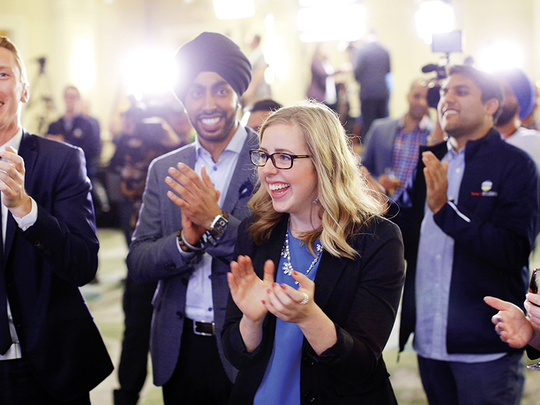
Vancouver: The ruling Liberal Party squeaked to victory in British Columbia elections, but it lost its majority after 16 years in power as the left-leaning New Democrats picked up seats, preliminary results showed.
The Liberals will now form the Western Canadian province’s first minority government in 65 years, and uncertainty over whether the parties will form coalitions left the future of big oil and gas projects in the region unclear.
John Horgan, the leader of the New Democratic Party (NDP), had vowed to stop Kinder Morgan Inc’s C$7.4 billion ($5.4 billion, Dh19 billion) Trans Mountain oil pipeline expansion if elected.
Horgan has also expressed reservations about a $27 billion liquefied natural gas terminal that Malaysia’s Petronas wants to build.
Going into the vote, the Liberals were neck-and-neck in the polls with the opposition NDP, whose campaign promise to make life more affordable in a province that is home to Canada’s most expensive real estate appeared to have resonated with voters.
With the vote count not complete, the Liberals, which are not linked to Canadian Prime Minister Justin Trudeau’s federal Liberal Party, had won 43 seats in the 87-seat provincial legislature. The NDP had 41 and the Green Party three.
Forty-four seats was needed for a majority.
“A majority of British Columbians voted for a new government and I believe that is what they deserve,” NDP leader Horgan told jubilant supporters to chants of “NDP, NDP”.
The Green Party tripled its seats from the last election, positioning the party to hold the balance of power in a minority government.
Green Party leader Andrew Weaver has said he is open to working with other parties provided they agree to abolish corporate and union donations.
Political fundraising was a thorny campaign issue in the province The New York Times has called the “Wild West of Canadian political cash” because of “unabashedly cozy relationships between private interests and government officials”.
“I will work with the other parties to do what needs to be done,” provincial Premier and Liberal Party leader Christy Clark told supporters, saying she intended to continue as premier.
The loss of its majority is a big blow for the Liberals, which had campaigned on a track record and promises of strong economic growth and job creation.
British Columbia had the highest rate of economic growth among Canada’s provinces in 2015 and is projected to have repeated that performance in 2016. The Liberals have also presided over five consecutive balanced budgets.
The Liberals held 47 seats in the previous legislature, the NDP had 35, the Greens one and two were held by independents.
Two seats were added after the 2013 election.












